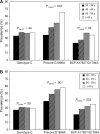Associations between hepatitis B virus genotype and mutants and the risk of hepatocellular carcinoma
- PMID: 18695135
- PMCID: PMC2518166
- DOI: 10.1093/jnci/djn243
Associations between hepatitis B virus genotype and mutants and the risk of hepatocellular carcinoma
Abstract
Background: The risk of hepatocellular carcinoma (HCC) increases with increasing level of hepatitis B virus (HBV) in serum (viral load). However, it is unclear whether genetic characteristics of HBV, including HBV genotype and specific genetic mutations, contribute to the risk of HCC. We examined the HCC risk associated with HBV genotypes and common variants in the precore and basal core promoter (BCP) regions.
Methods: From January 5, 1991, to December 21, 1992, baseline blood samples were collected from 2762 Taiwanese men and women who were seropositive for HBV surface antigen but had not been diagnosed with HCC; the samples were tested for HBV viral load by real-time polymerase chain reaction and genotyped by melting curve analysis. Participants who had a baseline serum HBV DNA level greater than 10(4) copies/mL (n = 1526) were tested for the precore G1896A and BCP A1762T/G1764A mutants by direct sequencing. Incident cases of HCC were ascertained through follow-up examinations and computerized linkage to the National Cancer Registry and death certification profiles. A Cox proportional hazards model was used to estimate the risk of HCC associated with HBV genotype and precore and BCP mutants after adjustment for other risk factors. All statistical tests were two-sided.
Results: A total of 153 HCC cases occurred during 33 847 person-years of follow-up. The HCC incidence rates per 100 000 person-years for participants infected with HBV genotype B or C were 305.6 (95% confidence interval [CI] = 236.9 to 388.1) and 785.8 (95% CI = 626.8 to 972.9), respectively. Among participants with a baseline HBV DNA level of at least 10(4) copies/mL, HCC incidence per 100 000 person-years was higher for those with the precore G1896 (wild-type) variant than for those with the G1896A variant (955.5 [95% CI = 749.0 to 1201.4] vs 269.4 [95% CI = 172.6 to 400.9]) and for those with the BCP A1762T/G1764A double mutant than for those with BCP A1762/G1764 (wild-type) variant (1149.2 [95% CI = 872.6 to 1485.6] vs 358.7 [95% CI = 255.1 to 490.4]). The multivariable-adjusted hazard ratio of developing HCC was 1.76 (95% CI = 1.19 to 2.61) for genotype C vs genotype B, 0.34 (95% CI = 0.21 to 0.57) for precore G1896A vs wild type, and 1.73 (95% CI = 1.13 to 2.67) for BCP A1762T/G1764A vs wild type. Risk was highest among participants infected with genotype C HBV and wild type for the precore 1896 variant and mutant for the BCP 1762/1764 variant (adjusted hazard ratio = 2.99, 95% CI = 1.57 to 5.70, P < .001).
Conclusions: HBV genotype C and specific alleles of BCP and precore were associated with risk of HCC. These associations were independent of serum HBV DNA level.
Figures


Comment in
-
Hepatitis B virus genotype and mutants: risk factors for hepatocellular carcinoma.J Natl Cancer Inst. 2008 Aug 20;100(16):1121-3. doi: 10.1093/jnci/djn261. Epub 2008 Aug 11. J Natl Cancer Inst. 2008. PMID: 18695130 Free PMC article. No abstract available.
Similar articles
-
Associations between hepatitis B virus mutations and the risk of hepatocellular carcinoma: a meta-analysis.J Natl Cancer Inst. 2009 Aug 5;101(15):1066-82. doi: 10.1093/jnci/djp180. Epub 2009 Jul 2. J Natl Cancer Inst. 2009. PMID: 19574418 Free PMC article.
-
Natural history of chronic hepatitis B REVEALed.J Gastroenterol Hepatol. 2011 Apr;26(4):628-38. doi: 10.1111/j.1440-1746.2011.06695.x. J Gastroenterol Hepatol. 2011. PMID: 21323729 Review.
-
Genomic change in hepatitis B virus associated with development of hepatocellular carcinoma.World J Gastroenterol. 2016 Jun 21;22(23):5393-9. doi: 10.3748/wjg.v22.i23.5393. World J Gastroenterol. 2016. PMID: 27340355 Free PMC article.
-
Carriers of inactive hepatitis B virus are still at risk for hepatocellular carcinoma and liver-related death.Gastroenterology. 2010 May;138(5):1747-54. doi: 10.1053/j.gastro.2010.01.042. Epub 2010 Jan 28. Gastroenterology. 2010. PMID: 20114048
-
The association between hepatitis B mutants and hepatocellular carcinoma: A meta-analysis.Medicine (Baltimore). 2017 May;96(19):e6835. doi: 10.1097/MD.0000000000006835. Medicine (Baltimore). 2017. PMID: 28489767 Free PMC article. Review.
Cited by
-
Asian-Pacific consensus statement on the management of chronic hepatitis B: a 2012 update.Hepatol Int. 2012 Jun;6(3):531-61. doi: 10.1007/s12072-012-9365-4. Epub 2012 May 17. Hepatol Int. 2012. PMID: 26201469
-
HBV DNA Integration into Telomerase or MLL4 Genes and TERT Promoter Point Mutation as Three Independent Signatures in Subgrouping HBV-Related HCC with Distinct Features.Liver Cancer. 2023 Apr 17;13(1):41-55. doi: 10.1159/000530699. eCollection 2024 Feb. Liver Cancer. 2023. PMID: 38344447 Free PMC article.
-
Hepatitis B virus genotypes, expression quantitative trait loci for ZNRD1-AS1 and their interactions in hepatocellular carcinoma.Oncotarget. 2016 Jul 12;7(28):44076-44083. doi: 10.18632/oncotarget.9854. Oncotarget. 2016. PMID: 27286450 Free PMC article.
-
Genogeography and Immune Epitope Characteristics of Hepatitis B Virus Genotype C Reveals Two Distinct Types: Asian and Papua-Pacific.PLoS One. 2015 Jul 10;10(7):e0132533. doi: 10.1371/journal.pone.0132533. eCollection 2015. PLoS One. 2015. PMID: 26162099 Free PMC article.
-
Exploring risk factors of hepatitis B virus-associated hepatocellular carcinoma: prospective verse retrospective studies.J Gastroenterol. 2011 Jan;46(1):125-7. doi: 10.1007/s00535-010-0314-5. Epub 2010 Sep 7. J Gastroenterol. 2011. PMID: 20820819 No abstract available.
References
-
- Lee WM. Hepatitis B virus infection. N Engl J Med. 1997;337(24):1733–45. - PubMed
-
- Beasley RP. Hepatitis B virus. The major etiology of hepatocellular carcinoma. Cancer. 1988;61(10):1942–56. - PubMed
-
- McMahon BJ. Hepatocellular carcinoma and viral hepatitis. In: Wilson RA, editor. Viral Hepatitis: Diagnosis, Treatment, Prevention. New York: Marcel Dekker; 1997. pp. 315–30.
-
- Chen CJ, Yang HI, Su J, et al. Risk of hepatocellular carcinoma across a biological gradient of serum hepatitis B virus DNA level. JAMA. 2006;295(1):65–73. - PubMed
-
- Yang HI, Lu SN, Liaw YF, et al. Hepatitis B e antigen and the risk of hepatocellular carcinoma. N Engl J Med. 2002;347(3):168–74. - PubMed
Publication types
MeSH terms
Substances
LinkOut - more resources
Full Text Sources
Other Literature Sources
Medical

